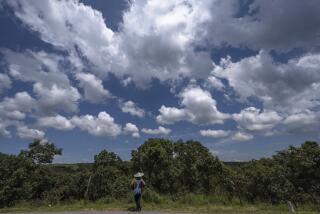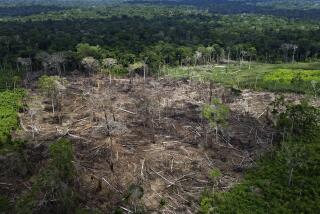Kingdom in Kinship With Trees
- Share via
UPPER GASELO, Bhutan — As forests around the world vanish, this secluded Himalayan kingdom is mounting a desperate effort to hold onto its trees.
Woodlands cover nearly three-quarters of Bhutan, a Switzerland-sized country nestled in the mountains between China and India. Surrounded by countries whose forests have been stripped, trampled and forgotten, Bhutan has embarked on one of the world’s toughest environmental campaigns, aimed at preserving the country’s spectacular natural bounty even at the cost of economic growth.
It is government at its greenest: More than a quarter of Bhutan has been set aside as national parkland. Not a single tree--on public or private land--can be felled without approval. In an impoverished country where trees are the most valuable resource, logging is permitted on less than 5% of the land.
And in one of the most drastic measures yet, the export of all unfinished timber was banned effective Jan. 1.
Although such laws might be seen in the West as the product of a radical fringe, in Bhutan the regulations are regarded as protecting an ancient way of life and the legendary abode of the gods. By virtue of its small size, isolated location and abundant natural gifts, Bhutan may represent the world’s most promising place for environmental preservation.
“We know that we are lucky to live here,” said Lopen Sono, a Buddhist monk standing outside his monastery at the 10,000-foot-high Pumola Pass, which offers a sweeping vista of western Bhutan. “Our country is a paradise.”
Whether the Bhutanese experiment succeeds will depend on how well the country can deal with the pressures that have overwhelmed so many developing nations.
Already, the threats to Bhutan’s arboreous way of life grow larger by the day. The Bhutanese, 70% of whom lack electricity in their homes, rely on wood for heat and to cook food. Bhutan also boasts one of the highest birthrates in Asia, prompting the government to launch an aggressive family planning campaign that has reached the most remote mountain villages.
What’s more, the government’s efforts to educate its nearly 2 million people is producing a generation of Bhutanese less wedded to nature and more covetous of Western comforts. A class of young businesspeople, eager to prosper, is beginning to question Bhutan’s nature-first paradigm.
“Times are changing. People are changing,” said Tenzin Thinley, 18, dressed in a leather jacket at Dodo’s disco in Thimphu, Bhutan’s tiny capital. “We’ve seen MTV; we’ve heard the music. Kids are restless. There’s nothing to do here.”
A Wilderness That Inspires Wonder
To an outsider, the breathtaking wilderness of Bhutan inspires the kind of wonderment recalled by the explorers of the New World: Limitless landscapes of dark green trees roll toward the horizon in every direction. The forests host animals that seem to have stepped from a children’s book: red pandas, white leopards, beastly yaks and huge, goat-like animals called takins. Through the capital, trout-clogged streams run cold and clear.
Rising from just above sea level to altitudes of nearly 25,000 feet in the space of about 100 miles, the country forms a kind of giant stairway on the sheer edge of the Himalayas. Bhutan harbors ecosystems as varied as subtropical forests and alpine meadows, boasting 200 species of mammals, 700 species of birds and 2,000 species of plants--in an area about one-tenth the size of California.
“In terms of environmental conservation, this is the best place on Earth to be,” said Jean-Claude Balcet, a World Bank economist overseeing a forestry project in eastern Bhutan.
Bhutan’s experience stands in contrast to the environmental catastrophe that has befallen much of Asia. According to the Asian Development Bank, half the continent’s forests have disappeared in the past 30 years, most of them gobbled up by advancing populations and economic growth.
In India, an ecologically rich country with nearly 1 billion people, forest cover has dwindled to 19%. In Indonesia, which is blanketed by some of the world’s finest forests but ravaged by economic crisis, the government announced in late December that it will auction off logging rights to more than 7 million acres of forest.
“What makes Bhutan unique,” said John MacKinnon, a scientist working in the country for the World Wildlife Fund, “is that it’s still here.”
Bhutan’s 43-year-old king, Jigme Singye Wangchuck, has moved to preserve the country’s environment at almost any cost--even at the short-term expense of his subjects, who rank among the poorest in the world. The king, one of the world’s last surviving absolute monarchs, insists that Bhutan can have both a strong economy and bountiful green forests.
“We could have been like the other countries and sold our forests and made a lot of money,” said Ugyen Tshering, Bhutan’s foreign minister. “But that would have been a short-term solution. We would still be a poor country, and our natural wealth would be gone.”
Woodlands in Bhutan Are Micro-Managed
The government of Bhutan micro-manages the country’s woodlands to a degree unheard of in the United States. In forests across the country, villagers are limited to gathering only dead or fallen trees for firewood. Each household is limited to one truckload a year.
To chop down a living tree, a villager must secure the approval of local forest rangers. The rangers then tramp into the forests and carefully mark the trees, usually old or dying ones, that the villagers may cut. Violators are fined.
A typical Bhutanese villager is limited to only three to five hardwood trees a year and, over the course of a lifetime, only about 30 or 40 pines to build a house. In areas where forest rangers are replanting trees, no wood--dead or alive--may be taken. The goal is to allow only so much logging as the forest can naturally replace.
“If you want to build a big house in Bhutan, it’s going to take you a long time,” Thinley Dorjee, a ranger in Phangyoulgang Forest, said with a chuckle.
By law, forest cover in Bhutan must not be less than 60% of the country. But Bhutan’s conservationist rules don’t end with the trees. Hunting is banned--except when an animal wanders into a farmer’s fields. In order to keep their numbers down, foreign tourists who come to Bhutan are charged a fee of $200 a day to visit the country and stay in drafty, creaky hotels.
Even the Poorest Know Forests Come First
To control the birthrate, health workers fan out across Bhutan, some into villages high in the Himalayas, drumming the message that the ideal Bhutanese family ought to have no more than three children. In gatherings around the country, health workers offer sex education, birth control and financial incentives for men and women to be sterilized. They pass out buttons adorned with a portrait of the king and a slogan: “Small Family--Happy Family.”
The message appears to be sinking in, if slowly. Ugyen Den, a 30-year-old mother, has five children. But her husband recently took the $4 government reward--a couple of days’ earnings for a typical Bhutanese--and had a vasectomy.
“The fewer children I have, the more I can give them,” Den said.
Den and her family live in Upper Gaselo, a high-altitude hamlet that hugs the verdant hills of the Phangyoulgang Forest. Here, even the poorest residents know that the forests come first.
“If the trees were given freely, people would cut everything,” she said.
The area around Den’s home is carpeted with trees, yet they are off limits to her and other villagers. The trees here are part of a reforestation project aimed at replenishing an area stripped bare years ago. Once a week, Den walks four hours to collect firewood, lugging 50-pound loads on her back.
“If this forest doesn’t help us,” she said, glancing at the newly wooded hills, “at least it will help our children.”
Such sentiment is typical. It’s difficult to find anything other than adoration for King Wangchuck and his vision of green.
Perhaps most important, nature occupies an exalted place in Bhutanese culture. A predominantly Buddhist country, Bhutan is dotted with ngeys--sacred mountains, lakes and forests where deities are believed to dwell. Villagers don’t disturb the ngeys for fear of disturbing the gods.
Some Bhutanese businesspeople are clamoring for the opportunity to take better advantage of the nation’s bounties. To boost business, for instance, travel agents are urging that the government reduce the $200-a-day fee for tourists during the off season.
“I think we can handle much more,” said Dago Beda, managing director of Etho Metho Tours and Treks in Thimphu.
Some Western forestry experts are privately skeptical of Bhutan’s long-term prospects. They worry that some forests already have been degraded by logging. And they say Bhutanese officials have been too reluctant to emulate other developing nations in turning over control of forests to villagers.
“They don’t want to give up their power,” said a consultant helping the government manage its forests.
For the time being, however, the forests of Bhutan still command the awe of their inhabitants. Kunley Choezang Kudrung, a monk at Punakha monastery in western Bhutan, recalled the travails of four young Bhutanese who disappeared three years ago in the forests around Thimphu. For 12 days they were lost, and only two were found alive.
The two survivors, Kudrung said, reported seeing strange things in the forest and a frothy, boiling disturbance in a lake. Word spread that the young hikers had trespassed on a ngey.
“Gods live there,” Kudrung said. “Everyone knows they cannot be disturbed.”
Filkins was recently on assignment in Bhutan.
More to Read
Sign up for Essential California
The most important California stories and recommendations in your inbox every morning.
You may occasionally receive promotional content from the Los Angeles Times.










